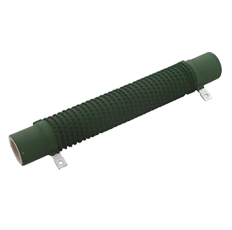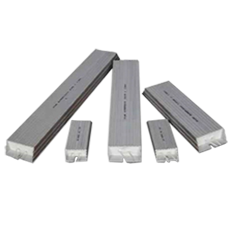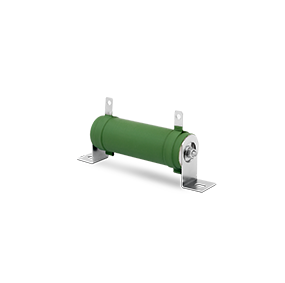- Home
- Power Resistors
- Stator resistors
All Categories
Product Series
- Show value(s)
Power
- Show value(s)
Resistance
- Show value(s)
Application
Construction
- Show value(s)
Mounting
- Show value(s)
Product Series
- Show value(s)
Power
- Show value(s)
Resistance
- Show value(s)
Application
Construction
- Show value(s)
Mounting
- Show value(s)
Stator resistors
Overview
Stator Series Resistors
Three phase induction motors generate huge input current during startup time that can potentially damage their stator coils. Stator series resistors are variable resistors used to prevent this damage. Read More
Induction motors comprise two main components – a static stator and a rotating rotor. They are also called squirrel-cage motors as the rotor design closely resembles a squirrel cage. The stator receives power from three phase supply lines and generates a rotating magnetic field that causes the rotor to rotate in the direction of the magnetic field (Lorentz Law).
During startup, since the rotor is initially stationery, the rotating magnetic field from the stator cuts the rotor bars at a very high rate. This causes very high induced EMF and current during start.
- Stator coils draw huge amount of current when the motor starts, which could potentially damage the stator.
- This will trigger a large voltage drop which could affect other devices in the line.
As the speed of the rotor increases, the rate at which the stator magnetic field cuts the rotor bars decreases. The above-mentioned problem is a transient problem encountered every time an induction motor is started.
Stator resistors are used to gradually increase the voltage supplied to the induction motor. This method is based on two fundamental electrical principles:
- If the supply voltage is reduced, then the current drawn by the stator is also proportionately reduced as per Ohm’s law. The starting torque in a three-phase induction motor is proportional to the square of the applied voltage.
Stator resistors are connected in series with the supply voltage to the stator. The resistance is gradually decreased and disconnected when the rotor speed reaches an optimal speed. Thus, the stator series resistor prevents excess stator current and high voltage drop in circuits involving induction motors.
Why KWK Stator Series Resistors?
KWK resistors come in various configuration and packaging that can be tuned for any specific customer’s needs. Ask for Custom Resistor Requirement.
All our products are ROHS (Restriction of the Use of certain Hazardous Substances in Electrical and Electronic Equipment) compliant.
Read LessShowing 17–32 of 59 results
-
KSE 90
Radial Type - 0.15 Ω - 7.5 Ω - 90W - 40PPM. KSE - Series-
Construction
-
Mounting
-
-
KSE 75
Radial Type - 0.12 Ω - 6 Ω - 75W - 40PPM. KSE - Series-
Construction
-
Mounting
-
-
KSE 50
Radial Type - 0.08 Ω - 4 Ω - 50W - 40PPM. KSE - Series-
Construction
-
Mounting
-
-
KSE 35
Radial Type - 0.05 Ω - 3 Ω - 35W - 40PPM. KSE - Series-
Construction
-
Mounting
-
-
KSR 1000
Radial Type - 1R0 Ω - 25K Ω - 1000W - 120PPM. KSR - Series-
Construction
-
Mounting
-
-
KSR 800
Radial Type - 1R0 Ω - 25K Ω - 800W - 120PPM. KSR - Series-
Construction
-
Mounting
-
-
KSR 500
Radial Type - 1R0 Ω - 25K Ω - 500W - 120PPM. KSR - Series-
Construction
-
Mounting
-
-
KSR 400
Radial Type - 1R0 Ω - 25K Ω - 400W - 120PPM. KSR - Series-
Construction
-
Mounting
-
-
KSR 300
Radial Type - 1R0 Ω - 25K Ω - 300W - 120PPM. KSR - Series-
Construction
-
Mounting
-
-
KSR 200
Radial Type - 1R0 Ω - 100K Ω - 200W - 120PPM. KSR - Series-
Construction
-
Mounting
-



